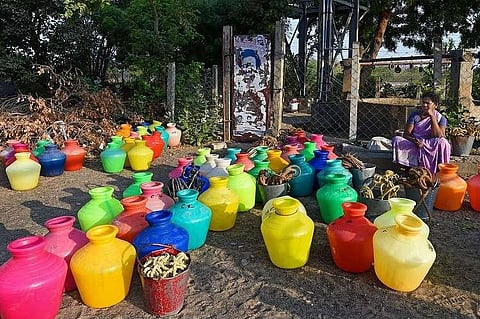

In the Thanthonni Thuruthu Island of Kochi, it’s common to see women standing around near the island’s public taps. These spots have become a makeshift meeting point for these women for a simple reason — about 60 fishermen families who live on the 110-acre island don’t have private water connections, and frequently face drinking water problems due to the lack of proper connectivity to the mainland.
It’s a similar situation for the residents of Njarackal of Vypin Island, where drinking water concerns are common and constant. The shortage of pipe connections to individual houses forces people to rely on public taps. And the situation is not much different in many coastal parts of Kerala, where seeing a long line of people carrying pots to collect water is a common sight. For these residents, life without public taps is unthinkable.
However, despite this dire scenario, the Kerala government has decided to close about two lakh public taps in the state, most of which were first opened in the 1970s. Minister for Water Resources K Krishnankutty announced in the first week of November that the government would shut off these taps. The decision was taken as part of the Jal Jeevan Mission (JJM), which intends to provide pipe coverage to rural Kerala. Though the government aims to provide 10 lakh new pipe connections to the area, the minister has told the media that in order to provide the private connections, it will have to disconnect the water supply to the public taps.
"How can they do that? We will have to die here. Most of the time there is not enough force in the water that comes through private connections,” said K Usha, a resident of Vypin, who was not aware of the government’s decision. “We depend on public taps. There are people who have to carry water two or three kilometers, as their private connections don't work.”
Krishna, a tribal coordinator at a Koraga tribal hamlet in Kasaragod district, notes that a majority of houses in his colony don’t have private water connections, and most cannot afford it either.
"They live by weaving baskets out of a grass. They cannot afford water connections. All of them depend on the public tap at the colony," he said.
Advocate Charles George, president of the Matsya Thozhilali Aikya Vedi, an all-Kerala fisherworker organisation, told TNM, that the government’s decision will largely affect marginalised communities.
"People in coastal areas, tribal hamlets, Scheduled Caste colonies, slum areas will be affected. In such colonies many of them live in rented houses and will not have private connections," he said.
Charles claimed that there was a hidden agenda behind the decision. "The government plans to privatise the water authority. Closure of public taps is the beginning of privatisation," he alleged.
It isn't just people lamenting, some employees of the Kerala Water Authority also oppose the government’s move.
"People living under the poverty line will be troubled by this move. They have to pay for a new water connection. At present, many families depend on this system for drinking water. How will private connections help them if they can't afford it?" All Kerala Water Authority Employees Union working president MM George said.
He noted that the union planned to protest until the decision is reversed. "Earlier there was a move to install a meter on public taps. But we opposed that as well because we believe that public taps are a part of our culture," he added.
In a meeting held at Jal Bhavan Thiruvananthapuram on Saturday, multiple unions discussed the issue. Parassala MLA CK Hareendran, who inaugurated the meeting, said that the taps were a fundamental right of marginalised communities, and that they should be protected.
However, there is also a group of employees who strongly support the government move. One employee, who requested anonymity, told TNM that public taps had caused a huge financial loss for the authority. "In the next five years, we aim to install 10 lakh new connections. Instead of one single public tap, we will be able to provide five private connections. So by disconnecting two lakh public taps, we will be able to provide about 10 lakh connections," he said.
He also noted that public taps were often misused by many, and a large of amount of water is lost daily due to leaks.